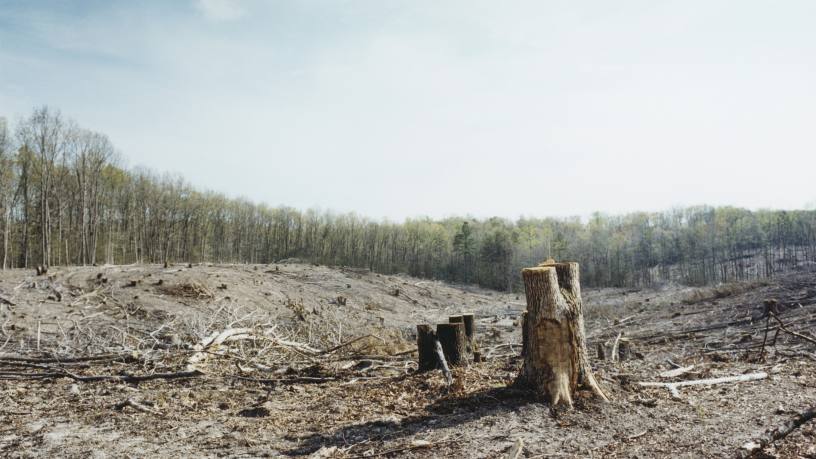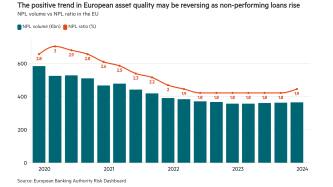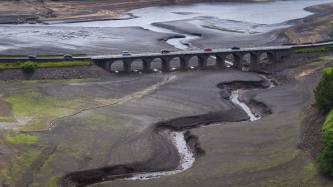As EU institutions came to a final agreement on rules to reduce deforestation on Tuesday, European banks insisted they were working hard to reduce investments in companies and projects linked to the destruction of forests.
The European Commission, Parliament and Council committed to a review within two years after the rules enter into force that will assess whether existing EU legislation is sufficient to tackle the role of financial institutions in global deforestation or whether new rules are needed to force the sector to conduct due diligence checks on their activities to verify they are not linked to deforestation.
The European Parliament had voted in September in favour of toughening up the Commission’s initial proposal and obliging EU-based banks to conduct due diligence to prevent investment projects linked to deforestation.
While this demand was not included immediately in the law, the list of products linked to deforestation and forest degradation covered by the regulation was extended. The final list includes coffee, timber, palm oil, cattle, soy and cocoa and their derived products, and negotiators agreed to add rubber, charcoal and printed products like books to the original list proposed by the Commission. Producers will have to prove these commodities are not linked to the destruction of forests to be sold in the EU.
A report by the World Wildlife Fund from 2021 found the EU was the world’s second largest importer of tropical deforestation and associated emissions, behind China. Between 2005–2017, EU imports caused 3.5 million hectares of deforestation, emitting 1807 million tonnes of carbon dioxide, equivalent to 40% of the EU’s total annual emissions, found the report. Soy, palm oil and beef were the worst offenders, followed by wood products, cocoa and coffee, with Germany, Italy, Spain, the UK, the Netherlands, France, Belgium and Poland responsible for 80% of this deforestation.
Triodos, the Dutch-headquartered bank focused on sustainable financing, was the only financial institution that had openly called for banks to be fully covered by the law from the outset. It expressed its disappointment that this was not the case, but the fact the EU will reassess this decision at a later date was “an important step”, it said.
Bank response
“Diligent application of strict sustainability criteria and mechanisms by all major financial institutions would trigger a shift in the financial sector and the economy at large towards more environmentally conscious financing and investment decision-making,” said a spokesperson for Triodos.
Rabobank responded to the rules by insisting it already had “strict policies and monitoring systems on deforestation”. The Dutch bank said: “Farmers or companies who illegally deforest do not get a loan and we do not finance illegal or legal deforestation, even if the local government allows it.”
La Banque Postale is trying to lead the way on climate action, becoming the first European bank to set a trajectory of how to achieve net-zero emissions that has been validated by the UN Global Compact’s Science Based Targets initiative. The French bank aims to make its banking activities net zero by 2040. Ending deforestation is a key pillar of action globally to try to reduce emissions and keep global heating below dangerous levels.
The asset management arm of La Banque Postale said in a statement that in 2020 it had begun to put in place “steps to fight against deforestation by excluding from its investment portfolio commodity producers that had been the object of controversy and not put in place convincing policies or remediation plans” to end their links to the destruction of forests. The EU law will “doubtless make it easier for investors to access data about companies’ value chains, allowing them to deploy more finely-tuned anti-deforestation policies”, said the bank.
BNP Paribas, the largest European bank by assets, said it had updated its forest policy in 2021 to reinforce its financing and investment criteria for the beef and soy sectors in the Amazon and the Brazilian Cerrado, a wooded area which represents almost two-thirds of the EU’s soy-related deforestation, according to Trase Insights, a not-for-profit initiative.
“For all our clients we will demand full traceability for direct and indirect supply chains for beef and soy from the Amazon and the Brazilian Cerrado by 2025,” said a spokesperson for the bank. By the same date “at the latest”, the bank pledges to end the offer of any products or financial services to companies that do not have a zero-deforestation strategy covering their production and supply chains.
The final text of the regulation will be rubber-stamped by the European Parliament and Council in 2023, and EU member states must start applying it within the following 18 months.












